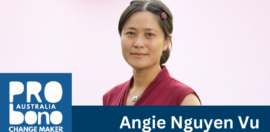Mergers & Acquisitions - NFPs in the Perfect Storm
26 May 2015 at 10:54 am
 A Not for Profit environment of more competition from for-profits for work, a tight funding environment and higher demand for services, has created the perfect storm for some organisations to consider a merger, writes Save the Children CEO Paul Ronalds.
A Not for Profit environment of more competition from for-profits for work, a tight funding environment and higher demand for services, has created the perfect storm for some organisations to consider a merger, writes Save the Children CEO Paul Ronalds.
Last week Save the Children Australia and Good Beginnings Australia, two organisations focused on improving the lives of some of Australia's most vulnerable children, announced a merger.
Both Save the Children and Good Beginnings have recognised there are insufficient resources to achieve a good beginning for every child, without doing things differently.
Mergers are part of a growing trend among Not for Profits.
Whitelion, a Not for Profit providing services to vulnerable young people, has completed mergers with two smaller organisations over the past few years.
Two major disability service organisations, VATMI Industries and the Endeavour Foundation, merged to better respond to the introduction of the National Disability Insurance Scheme. In Western Australia, UnitingCare West was created by combining eight Uniting Church agencies and parish missions.
And it's not just in Australia. Save the Children's international members last year merged with Merlin, a frontline health provider in humanitarian crises adding around 3,000 highly-trained medical staff to Save the Children.
And Plan, a child focused development organisation recently entered into a strategic relationship with International Medical Corps, an agency providing health care services to people impacted by war, natural disaster and disease.
What’s driving this flurry of M&A activity, more usually associated with Gordon Gekko or Wall Street? Are charities becoming obsessed with size at the expense of their cause?
It’s the contradiction at the heart of Australia’s Not for Profit sector.
Demand for services remains extraordinarily high. Globally, there are more people displaced or seeking refuge than at any time since the end of World War II.
Domestically, more than one million Australians live in poverty despite more than two decades of uninterrupted economic growth.
On top of this, Governments continue the trend towards outsourcing of social services.
As a result, the sector has never been larger, employed more people or had responsibility for delivering more services.
But this growth has been accompanied by increasing, and sometimes conflicting, pressures. These include pressures to professionalise, become more commercial, respond to rapid technological change, become more accountable and improve financial sustainability.
While once upon a time good intentions were good enough, stakeholders rightly demand Not for Profit be able to clearly demonstrate their impact and value for money.
Organisations like Good Beginnings and Save the Children are challenging themselves to put organisational ego aside and develop structures focused exclusively on whether they are achieving the best outcomes for children.
On the other hand, few donors are willing to fund organisational capacity building. Most donors see this as merely an ‘administration cost’ that reduces the funds available to be spent on the Not for Profit’s objectives. This has led to systemic underinvestment in organisational capability, precisely at the point of the greatest strategic change.
At the same time, State and Federal Government Budgets are under pressure from an ageing population while the mining boom is tailing off and global economic growth is weak.
Governments are also changing their funding approach – from one based on block grants to consumer-directed funding, the most high profile example being the National Disability Insurance Scheme. This, too, requires new skills and expensive new IT systems.
Increasingly, Not for Profits face more competition from for-profits for this to work.
For-profits now dominate the aged care sector and the NDIS trials have generated hundreds of new for-profit enterprises, seeking to compete for consumer directed disability funding. It’s the perfect storm.
Which is why it makes so much sense for organisations like Save the Children and Good Beginnings to be merging.
Combined, we will have an even better platform to address the fact that around 60,000 Australian children are beginning school not ready to learn.
The merger will generate opportunities for growth and efficiencies that can be invested into improved technical capability and innovation in programs and services for children and families.
More broadly, we hope it will encourage other not-for-profits to critically analyse their long-term capability to adapt to the rapid changes confronting the sector.
As Charles Darwin’s theory of evolution demonstrates, it’s not the strongest of the species that survives, nor the most intelligent, it is the one that is the most adaptable to change.
Unless Not for Profits face up to this evolutionary challenge, they will quickly become a species at risk. And so will the vibrant civil society that they seek to serve.
About the author: Paul Ronalds is Save the Children Australia’s Chief Executive Officer. Prior to joining the organisation in July 2013, Ronalds was First Assistant Secretary responsible for the Office of Work and Family in the Department of Prime Minister and Cabinet providing advice to the Prime Minister on a broad range of social and economic policies designed to assist families and communities. In the NGO sector, he worked for World Vision Australia as Deputy Chief Executive Officer and Director of Strategy. He was also Chief Operating Officer of Urban Seed, an NGO providing a range of services to marginalised people in Melbourne's inner city. He was also a corporate lawyer with international law firm Herbert Smith Freehills and co-founder of wishlist.com.au, one of Australia's most successful e-commerce companies.







